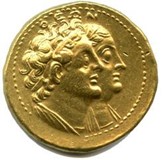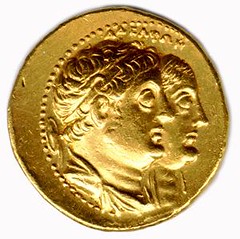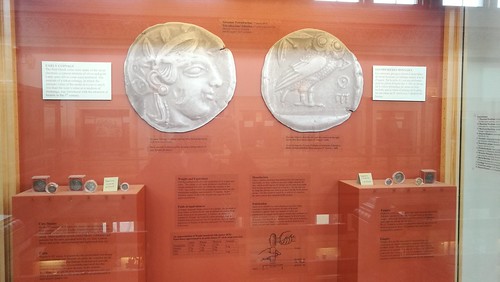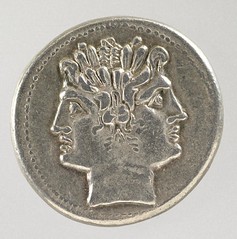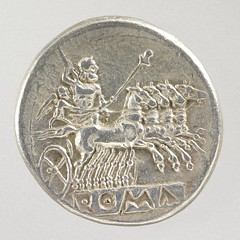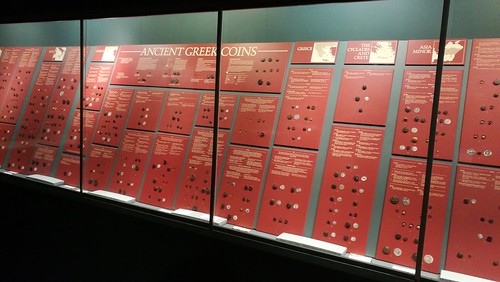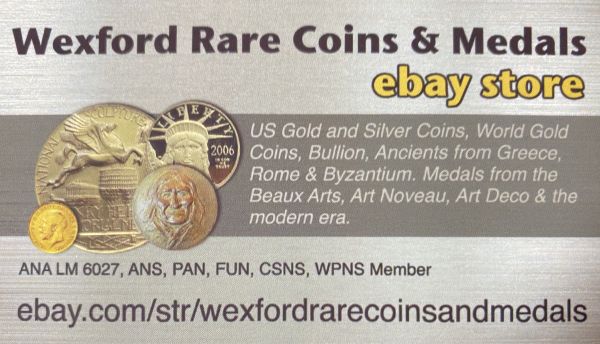
PREV ARTICLE
NEXT ARTICLE
FULL ISSUE
PREV FULL ISSUE
ANCIENT COIN COLLECTIONS IN CANADAYawei Zhang submitted this nice article on ancient coin collections in Canada. Thank you! -Editor
Ancient Coin Collections in Canada
As an integral part of world coin collections, ancient coins of the West (Greek, Roman, and Byzantine coins specifically) have been most widely researched and collected in Europe and the United States for centuries. Canadian universities and museums also hold systematic collections, though they remain on smaller scales. One of the best ancient coin collections in Canada belongs to the Nickle Galleries of the University of Calgary. Under the leadership of Marina Fischer, the collection specialist for numismatics, the galleries cooperate with the university enabling students to access the collections in class. The base of the numismatic collection, about 10,000 coins, comes from the Nickle Family. Following donations from other sources, the collection contains 23,000 objects right now with outstanding ancient coins. One of the most valuable items is a gold octodrachm minted in Ptolemaic Egypt bearing jugate Ptolemy I and Berenice I busts on the obverse, and their kids, Ptolemy II and his sister-wife Arsinoe II, on the reverse. Octodrachm, Obv. Ptolemy I and Berenice I; Rev. Ptolemy II and Arsinoe II, Ptolemaic Egypt, 285-246 BCE, Gold, No. NG.1990.1.47 Recently, the galleries acquired a Lydian electrum coin at a Heritage auction marking a milestone of the numismatic collection. Fischer uses her enthusiasm to popularize numismatics to the wider public through exhibitions, lectures, and other activities. Having such a passionate supervisor, I am expecting the further development of the collection. As one of the top-ranking universities in Canada, McGill University not only preserves a comprehensive ancient coin collection but also published a three-volume catalogue listing 1,763 coins. The collection consists of Roman coins (volume 1), Greek coins (volume 2), and ancient bronze coins (volume 3). McGill's numismatic collection came from the old McCord Museum in 1966. As for how the coins came to the university and what exactly they are, however, the answer is still uncertain because of incomplete records. After investigating the old archives, Sullivan concludes that the majority of the collection probably is a private collection created by a person who was interested in ancient coins. This person may have sold or donated to the university in the late nineteenth or early twentieth century. Now, part of the collection is in the exhibition at Redpath Museum in the university. An ancient coin cabinet in the McGill's Redpath Museum (Photo by author in 2019) McMaster University and the University of Saskatchewan have coin collections as well but with much smaller quantities. The Bruce Brace Coin Collection at McMaster Museum of Art contains 272 Roman coins. The university created a systematic online catalogue with enlarged pictures and detailed descriptions, as well as a bibliography and glossary. The Museum of Antiquities at the University of Saskatchewan shows a handful of Roman coins on their website as well.
See McMaster University's coin collection:
See the USask's coin collection:
Apart from the coin collections at universities, Canadian museums have decent ancient coins as well. The most well-known ancient coin collection is at the Royal Ontario Museum (ROM) in Toronto. From Asian-Pacific to the Mediterranean region, the ROM has a collection of comprehensive coins featuring 1800 Greek coins and 534 Roman Republic coins which is the largest in a Canadian institution. The earliest acquisitions of their Roman Republic coins were obtained in 1908 and the collection continuously developed in the following years. In 1998, the ROM published their Roman Republic coins edited by Alison Harle Easson. See: https://collections.rom.on.ca/collections/12393/currency-- commemorative-objects/objects . In an interview with Paul Denis, the Curator of the Ancient Greek and Roman Collections at the ROM, he says that scholars from the University of Toronto are cataloguing the Greek collection. Didrachm with janiform head of Dioscuri, Roman Republic, 225-212 BC, Silver, ROM collection No. 989.117.1 The Bank of Canada Museum in Ottawa has the world's most complete Canadian currency collection while the ancient coins are not their core concerns. Greek tetradrachms and Roman denarius function as a supplement of the economic history exhibition. As mentioned above, Canada is welcoming international cooperation and generous donations on numismatic research and collection as institutions like the Nickle Galleries are heading to a promising future. References:
Wayne Homren, Editor The Numismatic Bibliomania Society is a non-profit organization promoting numismatic literature. See our web site at coinbooks.org. To submit items for publication in The E-Sylum, write to the Editor at this address: whomren@gmail.com To subscribe go to: https://my.binhost.com/lists/listinfo/esylum All Rights Reserved. NBS Home Page Contact the NBS webmaster 
|
